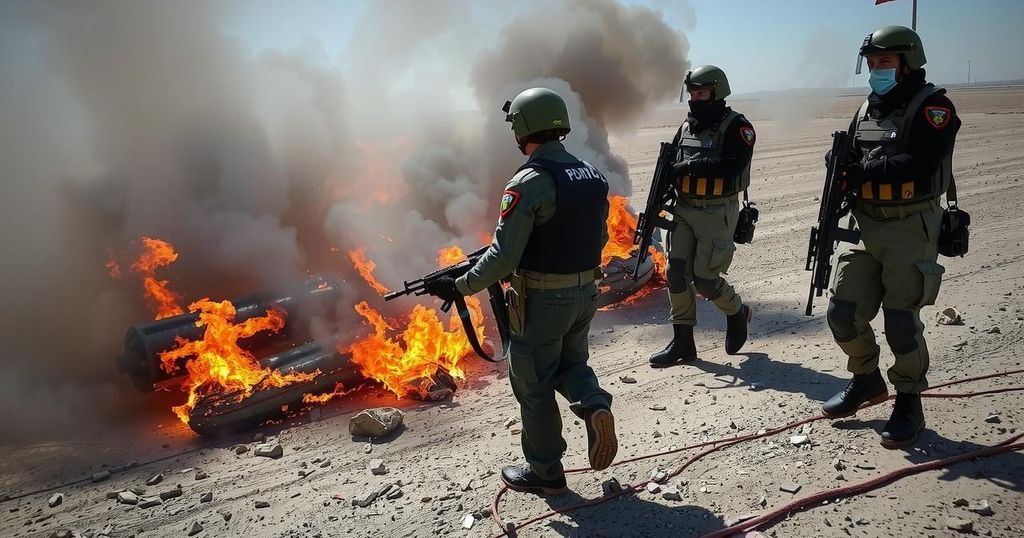Yemen’s Huthi Rebels: A Persistent Challenge for Israel Amidst Iran’s Decline

Yemen’s Huthi rebels pose an ongoing security challenge for Israel, maintaining strike capabilities despite Iran’s diminishing influence. Analysts note that Israeli military responses are complicated by the geographical distance and the necessity of careful intelligence operations. As the Huthis continue to disrupt life in Israel, strategic responses may evolve, highlighting the complex interplay of regional dynamics and alliances.
Israel faces a persistent challenge in Yemen’s Huthi rebels, who continue to act as a notable threat despite Iran’s weakened regional influence. Analysts highlight that even with the diminished power of Iran-backed factions like Hamas and Hezbollah due to extensive military actions by Israel, the Huthis represent an immediate and ongoing security concern. Control over much of Yemen, including its capital, Sanaa, has empowered the Huthis to launch missile and drone attacks targeting Israel, despite their limited military efficacy. The geographical distance complicates Israel’s response, restricting frequent strikes and making intelligence gathering difficult.
Michael Horowitz, head of intelligence at Le Beck, emphasizes that engaging the Huthis poses unique challenges: “Fighting the Huthis is a difficult endeavour for Israel for a number of reasons, the main being distance, which doesn’t allow for frequent strikes, and the lack of intelligence on the group.” The Huthis maintain their attacks in solidarity with the Palestinians, committing to continue hostilities until peace is reinstated in Gaza.
Horowitz speculates a possible shift in Israeli strategy towards targeting Huthi leaders and disrupting logistics, resembling Israel’s tactics against Hezbollah. Nonetheless, he cautions that restoring deterrence is uncertain. Recent Huthi missile activity, though largely intercepted, has caused disturbances in Israeli civilian life, prompting emergency responses.
In retaliation, Israel has engaged its air force to neutralize Huthi positions in Yemen, specifically targeting critical infrastructure. Prime Minister Benjamin Netanyahu has pledged to dismantle the “terrorist arm of Iran’s axis of evil,” while U.S. military operations aim to mitigate Huthi threats on maritime routes. However, some analysts express doubt regarding the efficacy of such efforts. Yoel Guzansky observes: “The Huthis remain the only ones still firing at Israel on a daily basis and it’s a problem that is not easy to solve.”
The potential for joint responses from Israel and Arab Gulf nations remains under discussion, particularly amid fears of escalating conflicts. Menahem Merhavy notes the Huthis present significant disruptions to global maritime commerce. This milieu suggests that regional dynamics might shift, especially with a more consolidated relationship between Israel and Saudi Arabia potentially emerging.
Despite the diminishing grip of Iranian influence, Mark Dubowitz warns that Iran retains resilience: “Tehran is skilled at regenerating its proxy networks,” underscoring that both Iran and its proxies should not be underestimated moving forward.
This article provides valuable insights into the evolving security landscape concerning Israel and the Huthi rebels of Yemen. As Iran’s regional leverage wanes due to Israeli military interventions, the Huthis have emerged as a significant threat. This analysis addresses how geopolitical developments influence Israel’s strategic responses, particularly relating to missile and drone attacks emanating from Yemen. The historical context of the Huthi’s reliance on Iranian support, coupled with the intricacies of their military operations and regional alliances, paints a comprehensive picture of ongoing tensions that may shape future diplomatic and military strategies.
In conclusion, the Huthi rebels continue to pose a significant challenge for Israel despite Iran’s diminished influence. Analysts note that the geographical distance and intelligence limitations hinder Israel’s military response against the Huthis, who maintain an active presence in striking Israeli territories. The evolving dynamics may prompt a reconsideration of regional alliances and strategies moving forward, particularly in light of ongoing tensions between the Huthis and Israeli forces. Continuous assessment of these developments is vital for understanding potential shifts in regional stability and security.
Original Source: www.hindustantimes.com








